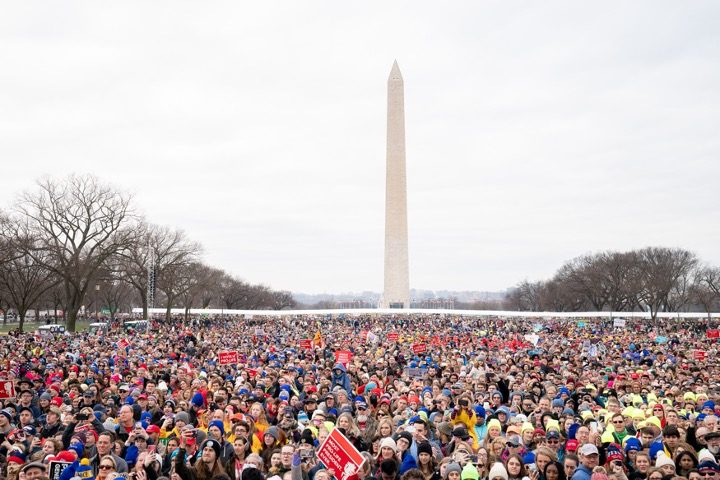
Last year’s March for Life celebrated the victory in Dobbs (Dobbs v. Jackson Women’s Health Organization), which returned the issue of abortion to the states. Initially a number of states had passed laws (becoming active on June 24, 2022) banning or greatly restricting abortion, and the mood of the thousands attending the demonstration was decidedly celebratory.
This year, the March for Life (which begins today and ends tomorrow afternoon at Capitol Hill) is likely to be much more subdued. The early victories have been forgotten in the wake of a series of defeats, as voters in several states have voted to keep abortion legal. Ohio, for example, enshrined the “right” to an abortion in the state’s constitution last November.
And movements to expand abortion “rights” are active in a number of other states heading into November.
Sponsors of March for Life have admitted that the victory in Dobbs was just the beginning of a long culture war. Although on its website it announced that “We celebrate each and every life, from the moment of conception. We envision a world where every life is celebrated, valued, and protected,” it also admitted that “the necessary work to build a culture of life in the United States of America is not finished … our most important work is changing hearts and minds,” adding:
The goal of the national March for Life is to not only change laws at the state and federal levels, but to change the culture to ultimately make abortion unthinkable….
We will continue to march every January at the national level until a culture of life is restored in the United States of America.
It’s going to take a lot more than a few thousand people showing up in Washington once a year to change the culture. In Ohio, Kansas, and Kentucky, recent efforts to extend and expand the right to life failed, and in other states abortion supporters are pushing their agenda leading up to November.
In Arizona, where abortion is banned after 15 weeks of pregnancy, pro-abortion advocates are petitioning to have voters expand that to 24 weeks. In Colorado, where there are no limits on abortion, abortion supporters see an opportunity to enshrine in the state’s constitution the right to murder an unborn child.
In Florida, where abortion is banned after 15 weeks, abortion supporters want to extend it to “viability.” In Maryland, where abortion is allowed up to “viability,” abortion supporters want to amend the state’s constitution granting a right to a mother to murder her child at any time during her pregnancy.
In Missouri, where abortion is banned at all states of pregnancy, supporters of abortion are moving to add a constitutional amendment that would keep the state from “infringing” on a woman’s “right to reproductive freedom.” In Nebraska, where abortion is banned after the first 12 weeks of pregnancy, pro-death advocates are moving to allow abortion up to the moment of birth.
In Nevada, where abortion is allowed up to 24 weeks of pregnancy, abortion advocates are moving to enshrine a woman’s “right to reproductive freedom” in that state’s constitution. In New York, abortion supporters have already placed on the November ballot language that would bar the state from discriminating against “pregnancy, pregnancy outcomes, and reproductive health care and autonomy.”
In South Dakota, where abortion is banned at all stages of pregnancy, a movement is afoot to repeal that ban and replace it with a much broader rule allowing abortion at each stage of pregnancy. And, in Washington, where abortion is already allowed until “viability,” Democratic Governor Jay Inslee has pushed lawmakers to add a question on the November ballot regarding changing the state’s constitution to “protect” access to abortion.
Speakers at the March for Life include those who recognize that the issue isn’t so much political as it is cultural, that politics is “downstream” from the culture and that that is where the real battle needs to be fought. They include Speaker of the House Mike Johnson (R-La.), Jim Daly (president and CEO of Focus on the Family), and Greg Laurie, pastor of Harvest Christian Fellowship.
Following the March for Life, Christian ministry Faith & Liberty will host “Prayers & Remembrance: Victims of Roe” on the west side of the Supreme Court building. It will take place on Monday, January 22, National Sanctity of Human Life Day, to remember the holocaust that began with the Supreme Court’s faulty ruling in Roe v. Wade that was announced 51 years ago, on January 22, 1973.



